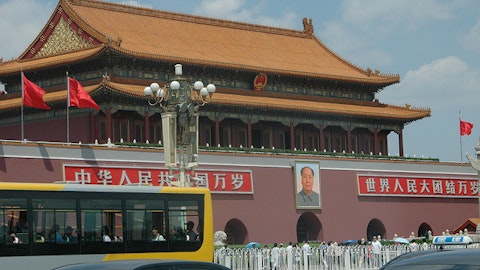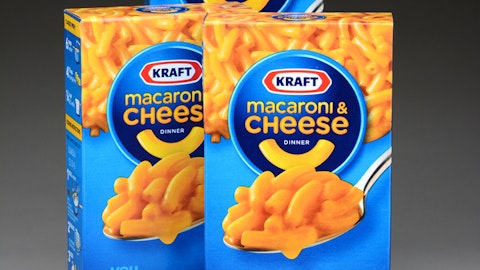Yale University graduate Lei Zhang founded Hillhouse Capital Management in 2005 with the objective to employ fundamentals-based, bottom-up analysis in choosing long-term investments. While the strategy has worked well for the billionaire investor’s firm over the long hail, it ran up against difficult market conditions in China during the first quarter, which dragged down its performance during the period. The weighted average returns of the fund’s 22 positions in companies with a market capitalization of over $1.00 billion came in at a loss of 15.7% in the first quarter. As mentioned, the chief reason for the weakness in the investor’s U.S equity portfolio was the performance of his China-based stock picks, which dominated his portfolio. In this article we’ll take a look at five of his favorite Chinese companies and see how they performed during the first quarter.
Our research at Insider Monkey determined that following the small-cap stocks that hedge funds are collectively bullish on can help a smaller investor beat the S&P 500 by around 95 basis points per month (see more details here).
#5 58.com Inc (ADR) (NYSE:WUBA)
– Shares Owned by Hillhouse Capital (as of December 31): 1.33 Million
– Value of Holding (as of December 31): $87.61 Million
A 90% boost to its 58.com Inc (ADR) (NYSE:WUBA) holding during the fourth quarter made matters worse for Hillhouse, as shares of the company fell by nearly 17% during the first three months of 2016. The Chinese online marketplace operator, which provides local information to about 395 cities that includes jobs, housing, used goods, tickets, etc. beat both the top and bottom-line estimates in its financial results for the fourth quarter. However, guidance for the first quarter was lighter than expected. The company’s minority-owned Guazi.com, a trading platform for used vehicles, recently completed a $204.5 million round of equity financing. Another money manager who is also bullish on the company is Andreas Halvorsen, as his fund Viking Global raised its stake in 58.com Inc (ADR) (NYSE:WUBA) by 8% to 1.87 million shares during the fourth quarter.
#4 Sohu.com Inc (NASDAQ:SOHU)
– Shares Owned by Hillhouse Capital (as of December 31): 1.65 Million
– Value of Holding (as of December 31): $94.41 Million
During the March quarter, shares of the $1.85 billion online media, search, and game services company fell by about 14.3%. While Hillhouse’s stake in the company remained unchanged during the fourth quarter, Jim Simons‘ renowned quant fund Renaissance Technologies hiked its Sohu.com Inc (NASDAQ:SOHU) holding by 31% to 1.23 million shares during the same period. As the consolidation in the Chinese online video sector continues, some analysts believe that Sohu will also be engulfed by this wave and sell a major stake in its video service to Tencent. Sohu.com Inc (NASDAQ:SOHU)’s gaming arm has been a sore spot for the company lately, with revenue from the business plunging by 31% year-over-year in the fourth quarter, which also contributed to a 2% decline in the company’s quarterly revenue.
Follow Sohu Com Inc (NASDAQ:SOHU)
Follow Sohu Com Inc (NASDAQ:SOHU)
Receive real-time insider trading and news alerts
Mr Zhang’s top three picks in China-based companies are analyzed on the following page.
#3 Ctrip.com International, Ltd. (ADR) (NASDAQ:CTRP)
– Shares Owned by Hillhouse Capital (as of December 31): 7.48 Million
– Value of Holding (as of December 31): $346.35 Million
Hillhouse doubled its holding in the travel service provider during the fourth trimester, and while the stock didn’t take off in the first quarter, it did fare better than many of its Chinese peers, posting a modest dip of 3%. Ctrip.com International, Ltd. (ADR) (NASDAQ:CTRP)’s fourth quarter EPS of $0.11 was $0.05 ahead of estimates, while its revenue of RMB2.87 billion ($440 million) marked a 50.3% increase from the year-ago period. However, light guidance and decelerating growth has investors somewhat cautious about the company. Ken Fisher‘s Fisher Asset Management has high hopes for Ctrip.com International, Ltd. (ADR) (NASDAQ:CTRP), as it raised its stake in the stock by 118% to 8.84 million shares during the fourth quarter.
#2 Qunar Cayman Islands Ltd (NASDAQ:QUNR)
– Shares Owned by Hillhouse Capital (as of December 31): 6.75 Million
– Value of Holding (as of December 31): $355.79 Million
Hillhouse’s Qunar Cayman Islands Ltd (NASDAQ:QUNR) holding, which was unchanged during the fourth quarter, slid in value during the March quarter, as the company’s stock plummeted by 23%. However, that performance was perhaps somewhat expected after the stock skyrocketed by about 75% during the fourth quarter of 2015. The circumstances have now changed for the $5.75 billion online travel provider after its rival Ctrip.com International, Ltd. (ADR) (NASDAQ:CTRP) acquired a 45% stake in the company late last year. According to some analysts this will seriously hinder Qunar’s growth, as in order to reduce competition, Ctrip.com will pressure it to discontinue its merchant model hotels and high-end hotel offerings, which accounted for about 25% of Qunar’s hotel revenue last year. Hence, Deutsche Bank downgraded Qunar Cayman Islands Ltd (NASDAQ:QUNR) to ‘Neutral’ from ‘Buy’ recently and set a price target of $38 on it, which would represent a sizable decline of about 14% from its shares’ current value. Soros Fund Management, the family office of the man who is known to have broken the Bank of England, George Soros, slashed its Qunar holding by 59% to 1.13 million shares during the fourth quarter.
Follow Qunar Cayman Islands Ltd.
Follow Qunar Cayman Islands Ltd.
Receive real-time insider trading and news alerts
#1 JD.Com Inc(ADR) (NASDAQ:JD)
– Shares Owned by Hillhouse Capital (as of December 31): 122.61 Million
– Value of Holding (as of December 31): $3.96 Billion
An 11% reduction to its JD.Com Inc(ADR) (NASDAQ:JD) holding during the fourth quarter helped Hillhouse escape some of the losses from the stock’s 17% decline in the first quarter. While the online direct sales company has been drawing customers away from its larger rival Alibaba Group Holding Ltd (NYSE:BABA), the move has also significantly hiked the company’s costs, causing a reduction in gross margin. This led analysts to reduce their profit forecasts for the company by 56% between mid-February and mid-March. More funds are also being allocated to JD.com’s financing arm in a bid to attract customers to brick-and-mortar stores. Stephen Mandel‘s Lone Pine Capital acted prudently when it reduced its JD.Com Inc(ADR) (NASDAQ:JD) holding by 38% to about 27 million shares during the final three months of 2015.
Follow Jd.com Inc (NASDAQ:JD)
Follow Jd.com Inc (NASDAQ:JD)
Receive real-time insider trading and news alerts
Disclosure: None





